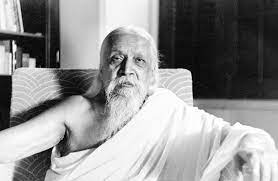Indian History
Sri Aurobindo: Prophet of Indian Nationalism
- 13 Dec 2022
- 4 min read
For Prelims: Sri Aurobindo, Prophet of Indian Nationalism, Indian National Movement, Azadi Ka Amrit Mahotsav.
For Mains: Sri Aurobindo’s Contribution in Indian nationalism Movement.
Why in News?
Recently, the Indian Prime Minister has participated in a programme commemorating Sri Aurobindo’s 150th birth anniversary in Puducherry, under the aegis of Azadi ka Amrit Mahotsav.
- The PM has released a commemorative coin and postal stamp in honor of Sri Aurobindo.
Who Was Sri Aurobindo?
- About:
- Aurobindo Ghose was born in Calcutta on 15th August 1872. He was a yogi, seer, philosopher, poet, and Indian nationalist who propounded a philosophy of divine life on earth through spiritual evolution.
- Aurobindo’s pragmatic strategies to get rid of British rule marked him as “the Prophet of Indian Nationalism”.
- Education:
- His education began in a Christian convent school in Darjeeling.
- He entered the University of Cambridge, where he became proficient in two classical and several modern European languages.
- In 1892, he held various administrative posts in Baroda (Vadodara) and Calcutta (Kolkata).
- He began the study of Yoga and Indian languages, including classical Sanskrit.
- Indian Revolutionary Movement:
- From 1902 to 1910 he partook in the struggle to free India from the British.
- The partition of Bengal in 1905 provoked Aurobindo to leave his job in Baroda and plunge into the nationalist movement. He edited the patriotic journal Bande Mataram to propagate radical methods and revolutionary tactics instead of supplication.
- He was arrested thrice by the British — twice for sedition and once for conspiring to “wage war”.
- He was imprisoned in 1908 (Alipore Bomb case).
- Two years later he fled British India and found refuge in the French colony of Pondichéry (Puducherry), gave up overt political activities and embraced spiritual pursuits, soon to emerge as one of the most original thinkers, philosophers and spiritual masters.
- He met Mirra Alfassa in Pondicherry, and their spiritual collaboration led to “Integral Yoga”.
- Integral Yoga, is a yoga of Earth transformation. The aim of this yoga is not an escape from life or a shunning of worldly existence, but a radical change in our life even while living amidst it.
- Aurobindo’s Ideas on Second World War:
- Several Indians saw the Second World War as an opportune moment to get rid of colonial occupation; Aurobindo asked his compatriots to support the Allies and ensure Hitler’s defeat.
- Spirituality:
- In Pondichéry he founded a community of spiritual seekers, which took shape as the Sri Aurobindo Ashram in 1926.
- He believed that the basic principles of matter, life, and mind would be succeeded through terrestrial evolution by the principle of supermind as an intermediate power between the two spheres of the infinite and the finite.
- Literary Works:
- An English newspaper called Bande Mataram (in 1905)
- Bases of Yoga
- Bhagavad Gita and Its Message
- The Future Evolution of Man
- Rebirth and Karma
- Savitri: A Legend and a Symbol
- Hour of God
- Death: He died on 5th December 1950 in Pondicherry.





